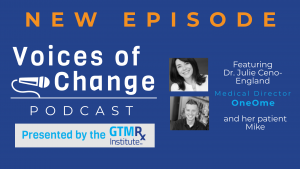Practice Transformation
As Congress and the administration work to “build back better,” they need to focus on primary care, write Ann C. Greiner, president and CEO of the Primary Care Collaborative, and Elizabeth Mitchel, president and CEO of the Purchaser Business Group on Health. They offer several concrete recommendations, including behavioral health integration and a move away from fee-for-service. “As we build back better and extend the coverage gains made by the Affordable Care Act, we must strengthen the platform on which achieving better, more equitable, more affordable care depends: primary care.” (STAT News)
Evidence & Innovation
Pharmacogenomic data can help optimize outcomes for patients with pain, but it remains underused and misunderstood in clinical settings. One reason is because few clinicians are trained in assessing and implementing test results, according to the authors of a literature review published in the Annals of Pharmacotherapy. “A one-size-fits-all approach to pain management is inadequate and outdated. With increasing genomic data and pharmacogenomic understanding, patient-specific genomic testing offers a comprehensive and personalized treatment alternative worthy of additional research and consideration,” they conclude. (Annals of Pharmacotherapy)
Researchers have developed a machine learning algorithm—Drug Ranking Using Machine Learning (DRUML)—that ranks drugs based on their efficacy in reducing cancer cell growth. “In this study we have demonstrated that large scale proteomics and phosphoproteomics data can be used … to rank drugs based on their predicted anti-proliferative effects in a given cancer cell population,” they write in Nature Communications. The approach may have the potential to advance personalized therapies in the future by allowing oncologists to select the best drugs to treat individual cancer patients. (Nature Communications; Medical Xpress)
ACE inhibitors may be associated with an increased risk for schizophrenia and may affect psychiatric symptoms, new research suggests. Individuals who carry a genetic variant associated with lower levels of the ACE gene and protein appear to be more likely to have schizophrenia. This suggests that drugs that lower ACE levels or activity may do the same, according to researchers. “These findings warrant greater pharmacovigilance and further investigation through pharmacoepidemiology studies into the effect of ACE inhibitors… in patients with schizophrenia,” researchers conclude. (JAMA Psychiatry; Medscape Medical News)
Policy Solutions
While 80% of employers agree immunization will allow them to move to a new normal in terms of returning to the workplace, only 10% believe vaccines should be mandatory, according to Willis Towers Watson’s Emerging Trends in Health Care Survey. More than a third of employers (35%) have developed policies and procedures to make it easy for workers to get the vaccine; another 50% are considering doing so. One in four employers (23%) are helping employees get vaccinated via various methods, including obtaining vaccines to administer to their employees; another 55% are planning on or considering doing so. (Fierce Healthcare; announcement)
Moving away from a nationwide media blitz, the Biden administration’s new COVID vaccine strategy will emphasize working with community groups—especially those working with underserved, including rural, populations. The localized campaign’s focus will be built around the slogan “We Can Do This” and will rely on messengers from these organizations to push the importance of the vaccine. They will receive grants and resources to promote the vaccine through activities including canvassing, town-hall meetings and local advertising. (Wall Street Journal)
Note: sources that have an asterisk require login to view the article.
In Case You Missed It!
JOIN TODAY: Building Vaccine Confidence During COVID-19:The Role of the Medical Neighborhood | GTMRx Institute & Bipartisan Policy Center (BPC) April 6 Virtual Event

Vaccinating Americans is critical to preventing severe illness or death from COVID-19 and ultimately stopping the pandemic. It is also essential in getting people back to work, to play and to living. To achieve widespread vaccination, engagement of the medical neighborhood is fundamental when implementing community programs designed to effectively build vaccine confidence. While we have seen encouraging vaccination rates, urgent action is necessary to reach herd immunity which experts estimate would require anywhere from 70% to 90% of the U.S. population be fully vaccinated. The reasons people are skeptical about taking the coronavirus vaccine are complex. Building vaccine confidence requires proactive and thoughtful public awareness, education and engagement of a variety of local stakeholders including community members.
Hear opening remarks from:
- Donald M. Berwick, MD, MPP · President Emeritus and Senior Fellow, Institute for Healthcare Improvement
- Senator William H. Frist, MD · Former U.S. Senate Majority Leader
- Anand Parekh, MD · Chief Medical Advisor, Bipartisan Policy Center
- Katherine H. Capps · Executive Director and Co-Founder, GTMRx Institute (Announcing the GTMRx National Task Force: Building Vaccine Confidence in the Medical Neighborhood)
Hear from the CDC’s Deputy Incident Manager for CDC’s COVID-19 Response:
- Karen Remley, MD · Director, CDC’s National Center on Birth Defects and Developmental Disabilities
Medical Neighborhood Panel discussion moderated by Susan Dentzer, Senior Policy Fellow, Robert J. Margolis Center for Health Policy at Duke University, to include:
- Sree Chaguturu, MD · Chief Medical Officer, CVS Caremark
- Lisa Fitzpatrick, MD, MPH, MPA · Founder and CEO, Grapevine Health
- Bruce Gellin, MD, MPH · President, Global Immunization, Sabin Vaccine Institute
Join BPC & GTMRx April 6, 2021 from 10:30 am – 12:00 noon ET. Find more information here.
Today, at the Bipartisan Policy Center and the Get the Medications Right™ (GTMRx) Institute event, GTMRx will announce the launch of a national task force to identify and address the reasons why 45% of Americans don’t feel confident about vaccination against COVID-19. The GTMRx National Task Force: Building Vaccine Confidence in the Medical Neighborhood is designed to forge partnerships with trusted members of the medical “neighborhood”—physicians, nurses, pharmacists and others on the patient care team, as well as public health leaders, social workers, consumer health advocates, social marketing and community health champions—and equip them with tools and messages to build confidence in COVID-19 vaccines.
A new report on overcoming vaccine hesitancy based on current and past research, Background and Resources to Build Vaccine Confidence in the Medical Neighborhood, will also be released.
Read more in our press release.

Over the last decade, there has been progress in defining and outlining CMM as part of a team-based care through research and descriptive reports. However, there are still gaps that exist which would benefit from added research focus moving forward. Based on a review of the current literature on the implementation and impact of CMM, this report outlines the existing gap areas and offers recommendations on approaches to close those gaps.
Developed by the Evidence-Based Resources Subgroup of the Practice and Care Delivery Transformation Workgroup.
Read the document here.
Medication problems generally fall into three buckets: overuse, underuse and misuse of medications. All three can contribute to higher costs and impact patient health.
These problems are detrimental in high risk patients who often lack any single provider managing the whole patient picture. This is where the clinical pharmacist can add incredible value by taking on the role of the medication expert on the health care team and systematically evaluating all the patient’s health issues, medications, lifestyle factors and desired health goals to optimize medication regimens. Read the full post.
Listen here.
Hosted by the GTMRx Institute’s executive director and co-founder, Katherine H. Capps, Voices of Change features leaders who have knowledge, experience and ideas to solve this urgent need to get the medications right. Did you miss the most recent episode?
AmazonSmile is an easy way for 0.5% of your qualified purchases go to the GTMRx Foundation at no cost to you. And signing up is simple—go to smile.amazon.com and select “Get the Medications Right Foundation” as your charity of choice. If you prefer to directly donate instead, you can do so here.
Adding the foundation on AmazonSmile will help us continue to provide no cost educational webinars, issue briefs, weekly news briefs and promote the need for transformation of our current system of medication use through social media campaigns.




